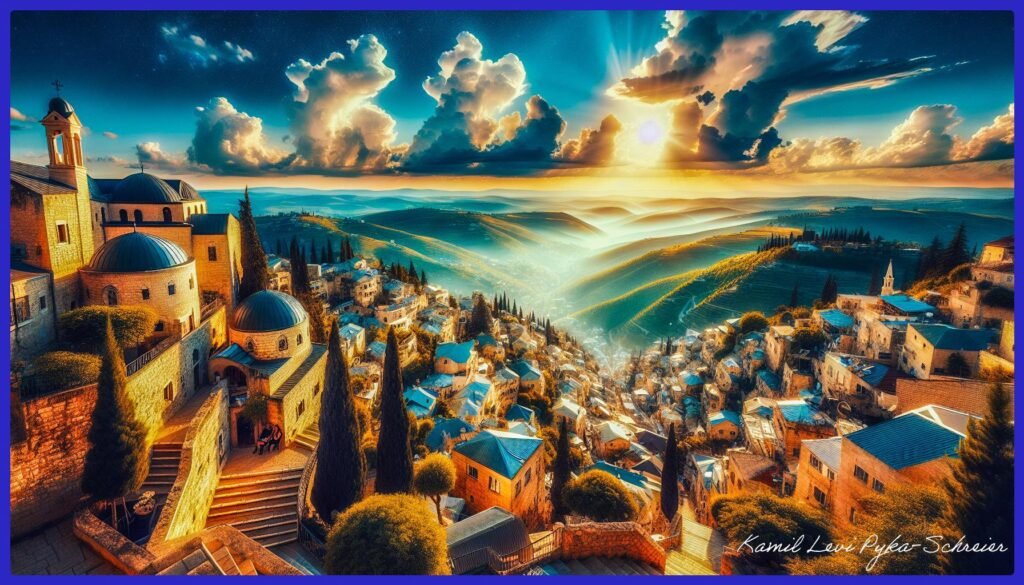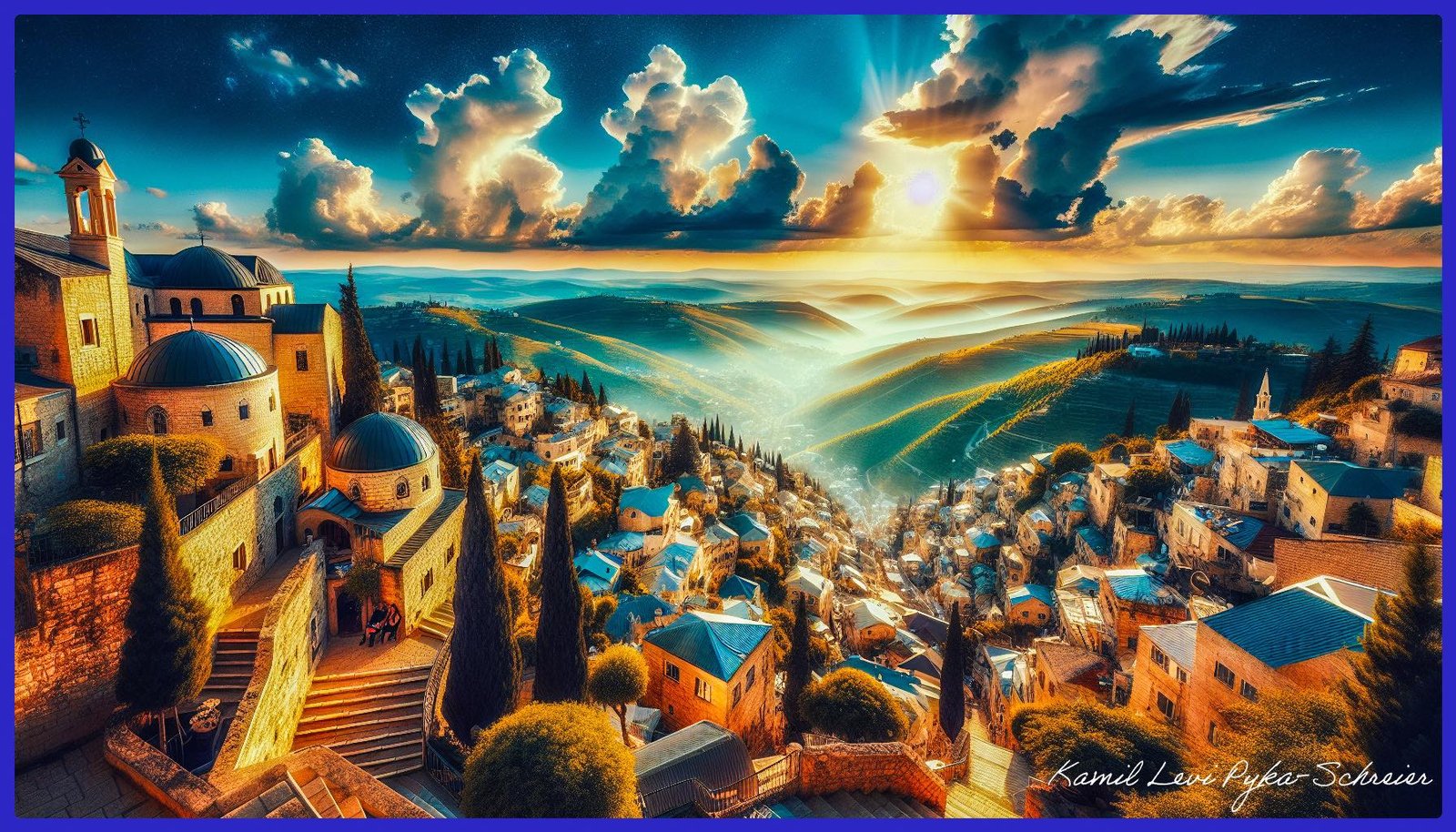
Parashat Ha’azinu is the 53rd weekly Torah portion in the annual Jewish cycle of Torah reading.
In the beginning of Moses’ performance, there is a song about crossing the Red Sea.
At the end of his life he sings a song that could be called a song about the Jordan.
These two singings represent a magnificent vision of future ages, a vision of the journey of Jisraele history. Before the eyes of the leader follow in a rapid succession the crucial moments in the history of his people.
With sharp strokes, he draws the image of his faithful, sharp and uninterrupted nation, the nation ready as to sacrifice as to turn away from G-d’s commandments.
Moses reminds all the main questions of Jewish thinking and his answer, the solution that he has it suggests that the nation is the last message of this servant of G-d.
Testimony of heaven and earth. Heaven and earth are called to witness the truth of G-d.
This special testimony was given by our interpreters different explanations. One of the most beautiful is this: The obedience of Israel before the Law represents one of the basic conditions of cosmic order.
When Israel leaves the way of the treaty, everything is crushed. The responses of our actions are incalculable and in any case exceed the area immediate, attempt.
In the universe, in this gigantic connection and chain of context, they cannot be physical and moral categories never completely separate. Together they participate in the category of the third, G-d’s truth, from which they come.
The attitude of man on morality, the actions of Israel, cannot be manifested in the physical state of the world. Thus, keeping heaven and earth in their natural order is completely subordinated to the behavior of Israel, his moral Power.
The sky and earth are immediately subject to it as two witnesses, their existence on the Israel position depending.
Faithfulness of G-d – Israel’s unfaithfulness.
“The rock of which is perfect, for all his ways are righteous (Deut).” 32,4). There is no expression more suitable to mark the unchanging strength of G-d than the metaphor “for the people of God who was present in the revelation of Sinai, it has a very special meaning.”
The mention of the granite stones from Sinai is repeated several times in this singing. And every time Moses refers to Being, which is still equal to himself, which is G-d just and faithful, without deception and violence.
The confirmation of G-d’s justice is essential for Jewish thinking. This justice appears before the eyes in a variety of ways, many aspects of it they remain incomprehensible, reason hidden. And it will be so long, if we strive to understand it only with our imperfect, individual human abilities.
The fifth verse puts countless difficulties before us. According to Hertz, you need to translate:
“Destruction is not from Him (shoet = destruction, lo lo = is not from Him).” The offence of his sons is that they are corrupt generations (banav mumam dor ikesh).
Rashi verse interprets according to the basic meaning of the sentence, but its meaning is in all comments are evaluated as well. Lessons from history. “Remember the past days (Deut.” 32:7). According to some interpreters, the phrase of the mitzvah (command) contains a positive character:
Learn from history, draw from it solid values, find in the past a true source of faith.
Israel does not understand history as a chaotic change of blind forces, accident, falls and disasters, but as construction gifted with the same order and the meaning of which we find in the great consequence of history nature. Searching in history was the real discovery of Jews, inspired by all positivist
and materialist schools, without knowing that they are so linked to the heritage of the sovereign religious thinking. For the believer’s Jew history, they represent immense singing.
In his heart he met all civilizations, all spiritual currents. The origin of the Jews is
very close to the roots of our civilization. The Jewish epic left a trace in the heart of all mankind, and it is in it that every Jew can and must finding a boost for yourself, find inspiration for the right decisions. After all, the history of Israel is the only living proof of G-d’s providence. Such are the words of Moses: They teach us to understand the history we consider to be the past, but for Moses, there is a sense of distance, hidden in the darkness of the future. Moses simultaneously with nothing incomparable certainty, without words reminding prophecies, of course it shows how the nation will go, if it acts in accordance with God’s will, and where it would be he was led by a rebellion against his most own mission.
Nowhere else is so clearly indicated the continuity with which the world develops, as here. Thus we should understand this mitzvah, from which the most important lesson is: encouragement for who hesitates, who wants to turn away from his people and his traditions. Proposition and punishment. The answer of the old men (Ask your old men and tell you – 32:7) is a proof the constant care of G-d for His people (32:9).
Yet Israel does not lose anything of his conceitability and deserves a label of hard neck.
Of course, this stubbornness can become a true value when it comes to keeping loyalty to G-d despite temptation and testing. But if the unsubject serves bad ideas, if the nation does not want to learn anything, he does not want to receive the lesson from the trials G-d has given him, this feature can become deep
proposal. The ungratitude of the nation becomes apparent (32:15), when it turns out that the bad tendencies have greater on it
influence than G-d’s teaching. Yet G-d does not pour out all anger on His people. It does not affect him with a complete and complete punishment, even if it is fair. G-d sends out all kinds of difficulties on Israel (32:12-25), but in the middle of a clash with him with him the punishment of the hand is turned away from the discretion of G-d’s name. Nothing would be worse than if the opponents of the Jews believed in the complete victory of their cause. G-d has set boundaries which nations, instruments of G-d’s will, can never cross. In this is the greatest consolation of Israel, the people who will be given the will of the nations for so long. One day G-d will demand accounts from those whom Jisrael has entrusted. He sets out with all who have entered the path of low revenge and suited under the wicked pretext his primitive motives, despising G-d’s statutes (32:43), instead of the nearness of the Jews fulfilled the work of moral elevation. Do not transgress G-d’s commandments, remember that even if it is not obvious, G-d is from His people they never completely separate – such is the message of Moses. The words of the Scriptures: Know, the nations that Israel he is not without the Hashem and without protection, do not abuse the power that is temporarily given to you. The law, the life of Israel. Moses ended his song, which will continue to live in the memory of the people.
And here again, again, commanded to follow what is for Jewish fate and mission the most important: Law.
For this Law is not an empty word. G-d has no intention of making our life more difficult than we do it is.
It is not rejoicing that it imposes restrictions and renunciation, because the law of G-d is only a work His good.
It has no other purpose than to show us the path of true happiness, to lead us to a life full of health, joy and holiness.
Israel has reached the end of painful years, and Moses has opened up before him one wish:
“I wish your days on this land which you have received inheritance (32:47) would be extended, and if they were to extend your days on this land which you have received inheritance (32:47).”
To prolong our days – even the prayer of Shema wishes us. The only condition is connected with this:
Live according to G-d’s Torah, in her spirit to contribute to the restoration of the world, to be a picture of justice and love.


